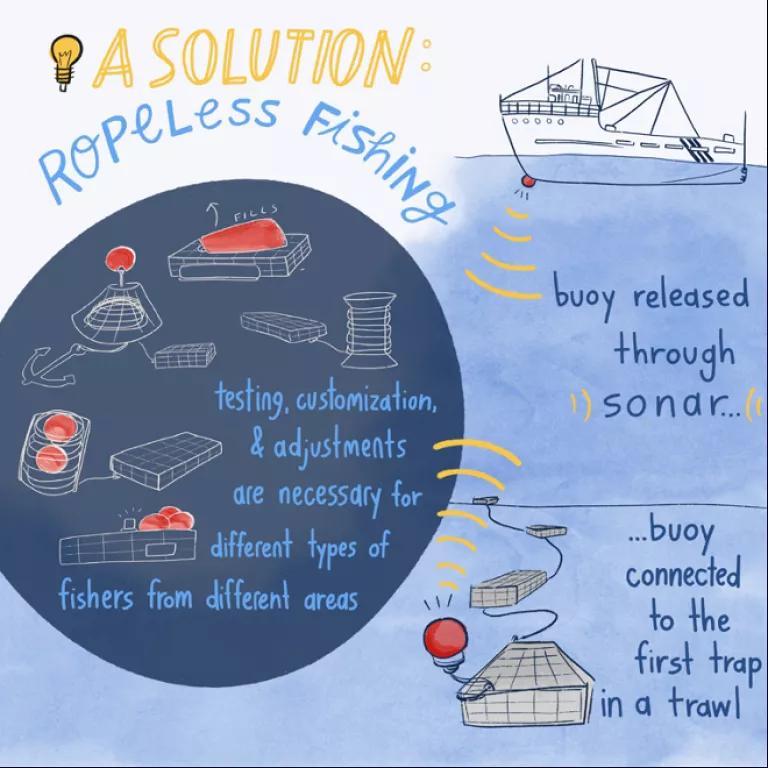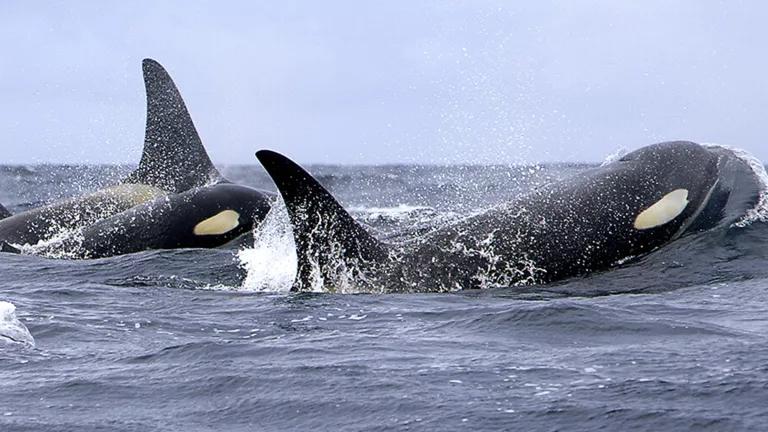Oregon Plan to Reduce Entanglement Risk Needs Improvement
Oregon Department of Fish and Wildlife (ODFW) has developed a Draft Conservation Plan outlining how the state will reduce entanglements of endangered and threatened whales and sea turtles in the Oregon commercial Dungeness crab fishery.

Endangered blue whales are one of the species at risk of entanglement off the Oregon coast and a focus of the Draft Conservation Plan.
NOAA Fisheries/Kelly Houle
Oregon Department of Fish and Wildlife (ODFW) has developed a Draft Conservation Plan outlining how the state will reduce entanglements of endangered and threatened whales and sea turtles in the Oregon commercial Dungeness crab fishery. The Draft Conservation Plan is a positive step forward, but more precautionary measures are needed to meaningfully reduce risk.
The number of whales and sea turtles observed entangled in commercial fishing gear off the U.S. West Coast has increased dramatically in recent years, including threatened and endangered humpback whales, endangered blue whales, and endangered leatherback sea turtles.
Of the 180 entanglements recorded off the West Coast between 2001-2019, just over half (54 percent) were confirmed as being entangled in commercial Dungeness crab gear. Because only a very small percentage of entangled animals are ever observed and reported, the number of entanglements of protected species occurring in the Oregon commercial Dungeness crab fishery likely exceeds sustainable levels.
Oregon state is seeking a federal permit under the Endangered Species Act to address this problem. The permit sets limits on the number of protected species that can be accidentally entangled by the fishery each year and requires management actions (such as fishery closures) if that limit is exceeded. In support of its application, ODFW is required to develop a Conservation Plan that outlines how risk to protected species from entanglement will be reduced in Oregon waters.

Humpback whale critical habitat overlaps with the commercial Dungeness crab fishing grounds off Oregon making the species particularly vulnerable to entanglement.
NRDC is supportive of ODFW’s proactive work to reduce the risk of whale and sea turtle entanglements in a manner that supports the health of commercial Dungeness crab fishery. However, we have significant concerns that the Draft Conservation Plan will not adequately reduce risk to these species off the Oregon coast.
In a letter submitted to ODFW and the Oregon Fish and Wildlife Commission, the American Cetacean Society, the Center for Biological Diversity, Oceana, Portland Audubon, Turtle Island Restoration Network, Whale and Dolphin Conservation, and NRDC identify several areas for improvement and urge ODFW to revise the Draft Conservation Plan accordingly.
We recommended ODFW:
- Strengthen the conservation measures in the Draft Conservation Plan to reduce risk during times of year when whales and sea turtles are present off Oregon in high concentrations.
- Include additional precautionary measures and emergency actions to reduce risk when entanglement limits are approached or reached.
- Consider additional rules to reduce risk to gray whales and evaluate impacts to highly endangered species that may be present, such as North Pacific right whales and Southern Resident orcas.
- Strengthen and add detail to the monitoring plan.
- Incentivize the testing and approval of pop-up (or “ropeless”) fishing gear for use during times and in areas otherwise closed to the fishery.

Ropeless (or “pop-up”) fishing has the potential to virtually eliminate entanglement risk off Oregon while keeping fishermen on the water
Jessica Russo/NRDC
We are also concerned that the conservation community will not be called on to help guide the implementation of the Draft Conservation Plan going forward. The management actions implemented by the Department through the Plan will be advised by several advisory committees. These committees comprise a wide array of industry representatives and select scientists but do not explicitly include members of the conservation community, as is the norm in most state and federal bycatch reduction processes. Conservation professionals provide a unique perspective and expert knowledge critical to any consultation process concerning the management of endangered species. Unless resolved, this gap may result in an erosion of trust in the Conservation Plan.
The success of the Conservation Plan may also be stymied by lack of adequate funding. The effectiveness of the Conservation Plan is contingent on a well-funded and well-resourced monitoring and dynamic management effort. In the context of a tri-state incidental take permit, it is also important for management effectiveness and requirements for fishermen to be equitable across states. In our letter, we recommended that ODFW and the Commission work with NOAA Fisheries to address this funding gap.
NRDC voiced these overarching concerns directly to the Oregon Fish and Wildlife Commission in public testimony at the Commission meeting on 17 September.
NRDC remains highly supportive of ODFW’s effort to reduce the harm that Oregon crab gear poses to marine wildlife, and we support the goal of having both healthy fisheries and a thriving ecosystem. We urge the Department to revise its Draft Conservation Plan to ensure that robust and effective management, monitoring, and assessment measures will meet that goal and safeguard Oregon’s wildlife under changing ocean conditions.




